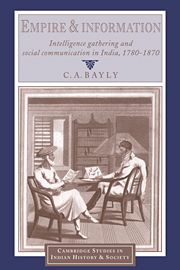Book contents
- Frontmatter
- Contents
- List of maps
- Preface
- Glossary
- List of abbreviations
- Introduction
- 1 Prologue: surveillance and communication in early modern India
- 2 Political intelligence and indigenous informants during the conquest of India, c. 1785–1815
- 3 Misinformation and failure on the fringes of empire
- 4 Between human intelligence and colonial knowledge
- 5 The Indian ecumene: an indigenous public sphere
- 6 Useful knowledge and godly society, c. 1830–50
- 7 Colonial controversies: astronomers and physicians
- 8 Colonial controversies: language and land
- 9 The information order, the Rebellion of 1857–9 and pacification
- 10 Epilogue: information, surveillance and the public arena after the Rebellion
- Conclusion: ‘Knowing the country’
- Bibliography
- Index
7 - Colonial controversies: astronomers and physicians
Published online by Cambridge University Press: 28 October 2009
- Frontmatter
- Contents
- List of maps
- Preface
- Glossary
- List of abbreviations
- Introduction
- 1 Prologue: surveillance and communication in early modern India
- 2 Political intelligence and indigenous informants during the conquest of India, c. 1785–1815
- 3 Misinformation and failure on the fringes of empire
- 4 Between human intelligence and colonial knowledge
- 5 The Indian ecumene: an indigenous public sphere
- 6 Useful knowledge and godly society, c. 1830–50
- 7 Colonial controversies: astronomers and physicians
- 8 Colonial controversies: language and land
- 9 The information order, the Rebellion of 1857–9 and pacification
- 10 Epilogue: information, surveillance and the public arena after the Rebellion
- Conclusion: ‘Knowing the country’
- Bibliography
- Index
Summary
The following two chapters examine a series of debates which took place among the British and Indians in the early nineteenth century concerning astronomy, medicine, language and geography. Indian kings had fostered these forms of knowledge because they bore directly on the health and good order of the body politic. For their part, the British believed they could demonstrate intellectual superiority in such disciplines, even while they were uneasily aware that European scientific opinion was itself uncertain and divided. By surveying these debates we can examine British information-gathering beyond the bounds of warfare and statecraft. We also encounter Indians adapting their styles of argument to the new media and using them to conduct polemics about the status of Indian and western learning. The intellectual associations and alliances which emerged from such encounters were harbingers of an Indian nation. Indian protagonists in colonial debates were forming connections across the whole subcontinent and appealing to a national intellectual tradition two generations before indigenous political associations began to emerge.
The shape of the Indian astral sciences
The Indian astral sciences were typical of the knowledges of the ecumene. They were fractious disciplines and also highly political ones because observation of the heavens determined the correct timing for worship, war, politics and agriculture. For their part, the British grappled with these sciences and interrogated their specialists for practical reasons but also because astronomy, since Halley and Newton, had been regarded as a domain of national intellectual triumph. We consider first the Indian inheritance and then the British critical onslaught. Hindu and Jain astronomy (jyotishastra) and their associated mathematics and astrology were designed to foretell auspicious times for rites, alliances and day-to-day transactions.
- Type
- Chapter
- Information
- Empire and InformationIntelligence Gathering and Social Communication in India, 1780–1870, pp. 247 - 283Publisher: Cambridge University PressPrint publication year: 1997

